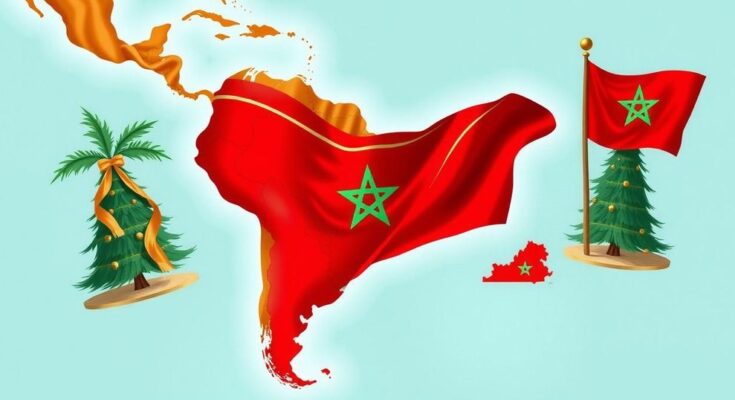In 2024, Latin American nations shifted their stance concerning the Moroccan Sahara, increasingly supporting Morocco’s autonomy initiative. Key countries like Ecuador, Panama, Paraguay, Brazil, and Chile have formally distanced themselves from the Polisario Front, demonstrating a growing recognition of the legitimacy of Morocco’s territorial claims. This diplomatic evolution reflects broader global changes that may significantly impact the future of the Sahara conflict.
The year 2024 marks a significant transformation in the diplomatic dynamics between Latin American nations and the Moroccan Sahara issue. Through diligent diplomatic endeavors spearheaded by King Mohammed VI, Morocco has successfully garnered increasing support from countries like Ecuador, Peru, Brazil, Paraguay, and Chile, while simultaneously undermining separatist claims in the region. Several nations have taken concrete steps by suspending recognition of the Polisario Front, indicating a trend of reconsideration regarding their previous stances on this matter.
In honoring the anniversary of the Green March, King Mohammed VI underscored the imperative for ongoing mobilization to uphold the territorial integrity of Morocco. His clarion call resonates with the actions taken by various Latin American states that are beginning to view Morocco’s autonomy proposal as a viable resolution to the longstanding conflict over the Sahara. Notably, Ecuador’s decision to cease recognition of the “phantom republic” in October was shortly followed by Panama’s similar action in November, highlighting a collective shift in recognition and diplomatic relations.
This realignment reveals a rising global acknowledgment of the illegitimacy of the Polisario Front under international law. Miguel Angel Rodriguez Mackay, the former Minister of Foreign Affairs of Peru, stated that the retraction of recognitions from this separatist entity is becoming “inevitable.” Meanwhile, Paraguay’s legislative body has formally declared its support for Morocco’s territorial claims and encouraged the executive to align with this stance. Furthermore, Brazil’s Senate expressed endorsement for the autonomy initiative amid compliments from the Brazilian Foreign Minister regarding Morocco’s earnest approach to resolving the dispute.
Chile has also joined this momentum, with its Foreign Minister announcing support for a just and enduring political solution that aligns with the Moroccan initiative. Concurrently, Morocco has fostered greater economic collaboration through a newly established forum promoting strategic ties among Latin American and Caribbean nations. Support from regional parliamentary associations such as the Mercosur Parliament and the Central American Parliament further reinforces the diplomatic gains Morocco has made.
Additionally, Morocco’s endeavors extend beyond formal diplomacy as it successfully engages with Latin American public opinion through educational institutions and media platforms. This has diminished traditional support for the Polisario Front previously backed by Algeria. As a result, there is a notable shift in perception among the Latin American elite towards recognizing the validity of the Moroccan cause and the practicality of the autonomy initiative.
Through consistent and skillful diplomatic efforts, Morocco is gradually achieving substantial victories on the international front, rendering separatist ideologies increasingly obsolete amidst the rapid evolution of global diplomatic stances.
The issue of the Moroccan Sahara has long been a contentious point in international relations, particularly involving separatist groups like the Polisario Front, which has received support from Algeria. However, recent diplomatic efforts by Morocco, led by King Mohammed VI, have initiated a strategic shift in the perspectives of several Latin American countries. The actions taken by these nations signify a growing awareness of the possibilities of autonomy solutions over separatism, informed by Morocco’s authentic diplomatic overtures and efforts to strengthen its stance on territorial integrity.
In summary, the diplomatic landscape regarding the Moroccan Sahara issue is witnessing a pivotal transition in Latin America, with numerous countries re-evaluating their previous support for the Polisario Front. The momentum towards endorsing Morocco’s autonomy initiative reflects a broader acknowledgment of its legitimacy and viability as a peaceful resolution to the conflict. As Morocco continues to pursue effective diplomacy, I anticipate that these shifts will not only strengthen its international standing but also lead to enduring regional support for its territorial integrity.
Original Source: fesnews.media




